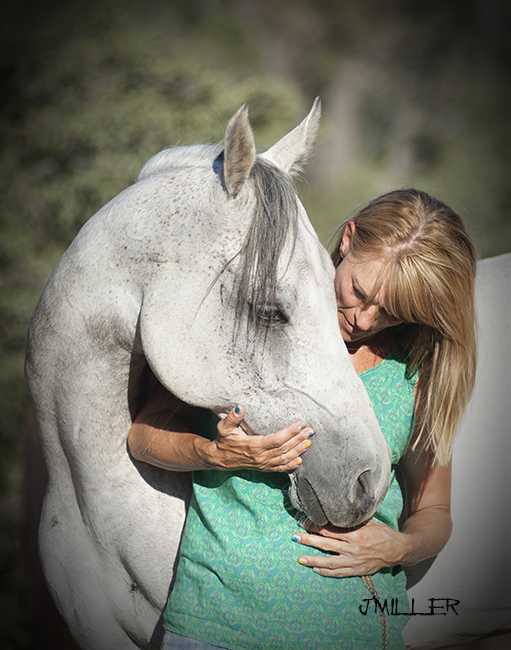The Horse as Partner, not a tool- Guest Blog Angela Dunning
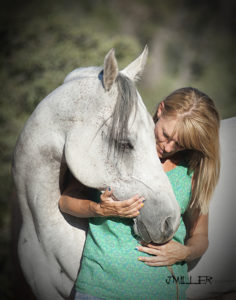
The Horse as Partner, not a Tool. How our Inter-Species Relationship can bring us Change and Enlightenment.
We have come a long way in our relationships with horses, and I mean, a long way. Today we have very different uses for horses, mostly involving leisure as well as a few working roles still such as police horses. But long-gone are the days of pit ponies, horses in the military, taking care of our transport needs or ploughing the fields with us.
The most remarkable development in our ancient connection to these four-legged beauties is one which began to slowly transpire towards the end of the last century and which has rapidly gathered pace during the first couple of decades of this millennium. I’m talking here about the unique and powerful role that horses have stepped up to offer people through emotional, psychological, and spiritual development. This work takes various forms, but the most common are equine facilitated/assisted learning, coaching, therapy and psychotherapy.
Partnering with horses to support and heal
Across the world, professionals are partnering with horses to support vulnerable and troubled people heal from trauma, addiction, abuse, co-dependency and general poor self-esteem. Children, young people and adults, men and women; all seem to be benefiting enormously through never before experienced breakthroughs, enhanced self-confidence and emotional resilience. As well as developing much needed tools for coping with our busy, modern day lifestyles and environments in the forms of mindfulness, meditation and presence.
I have been involved with this new profession for over a decade now and trained with one of the foremost leaders in 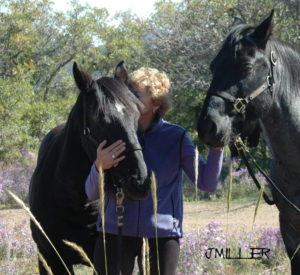 this field, best-selling author and trainer, Linda Kohanov of the Eponquest Foundation in Arizona. At the heart of my approach and that developed by Kohanov, is the central idea of the horse being a sentient being in their own right. We come together with our equine partners to support others and inherent in this approach is the mindset that we are just that; partners.
this field, best-selling author and trainer, Linda Kohanov of the Eponquest Foundation in Arizona. At the heart of my approach and that developed by Kohanov, is the central idea of the horse being a sentient being in their own right. We come together with our equine partners to support others and inherent in this approach is the mindset that we are just that; partners.
What this approach does is bring human facilitator and horse onto a more equal footing. Here we can leave behind outdated top-down approaches, where we believe we know more than the horse, and crucially, where we dominate or control the horse’s input.
Using this approach we can then benefit the most from the horse’s innate ability to sense, intuit and empathize with the pain or problem a person faces, in any given moment. With freedom to move, chose and lead, our horses can go directly to the place in that person – whether it be their body, heart, mind or the burden of their past – which needs attention and support the most on that occasion.
The beauty of letting the horse guide the process is that it minimalizes human interference on the part of the facilitator/s present. It precludes the need for agenda and expectations and their associated feeling of pressure. It also reduces the amount of cognitive or mental involvement, as well as the verbal. Both areas that mean very little to horses.
“Horses can best be described as Buddha’s on four-legs.”
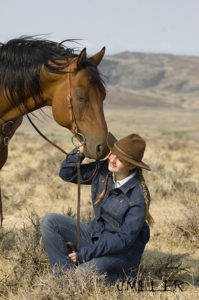 Horses can best be described as Buddha’s on four-legs. They inhabit the realm of fully, attentive, mindful presence all of the time; the lucky things! They truly live up to the saying: “Know the Yang, but keep to the Yin.” They are exquisitely in-tune with their body, emotions, needs and energy in every single moment. They are free from thoughts and plans, or ruminations on the past or whimsical day-dreams. They just are. In the here and now. In addition to this, they are completely in-tune with everything in their environment, making them excellent guides to help us sense what is happening all around and within us.
Horses can best be described as Buddha’s on four-legs. They inhabit the realm of fully, attentive, mindful presence all of the time; the lucky things! They truly live up to the saying: “Know the Yang, but keep to the Yin.” They are exquisitely in-tune with their body, emotions, needs and energy in every single moment. They are free from thoughts and plans, or ruminations on the past or whimsical day-dreams. They just are. In the here and now. In addition to this, they are completely in-tune with everything in their environment, making them excellent guides to help us sense what is happening all around and within us.
These incredible natural abilities are what make them so good at helping people become more self-aware. Bringing us fully into the present too, to join them with whatever feeling or desire is bubbling up in us in each moment. They help us stay focused, present and grounded in our bodies, our feelings and our connection to them.
All of this paints a strikingly different picture to one of the horse being a machine or a tool for our use and benefit. If we were to paint such a picture, it would look and feel quite unpleasant in comparison. We would probably feel highly uncomfortable with the amount of control we were needing to exert over these gentle, loving, sociable animals. We might question why we have so many agendas, timescales, pressures and expectations of our horse. All of which limits and can even negate, them displaying their natural abilities to us freely and lovingly.
Sadly, some of these more dominant, old fashioned attitudes towards horses have begun to seep into this blossoming new field of work too. Which is why I have written an entire book exploring why this might be happening, how it manifests, and most importantly, how professionals can re-direct their approach to one which values and harnesses the horse’s innate gifts on offer to us.
Highly recommended by Linda Kohanov herself.
My book, The Horse Leads the Way. Honoring the Role of the Horse in Equine Facilitated Practice, comes highly recommended by Linda Kohanov herself. It tackles some of the core skills we need to develop to do this work well and it challenges some of the current trends which aren’t so supportive of the horses, or clients. Finally, it offers many suggestions for working which build-on and support the uniquely powerful method which comes from partnering with horses; thereby bringing the method back to its central ethos and purpose.
It is high time to shed the idea of horses being a commodity for us to make personal gains. Instead, we are being offered the opportunity to enter a space of inter-species understanding and community. We can learn from the horses, integrate their profound gifts, and then take The Way of the Horse back in to all areas of our lives so that we fully honor their help. And so that we help humanity to evolve into a more compassionate, community-oriented species, rather the highly individualized and destructive one that we are in danger of fast becoming.
If you’re interested in finding out more about how I work, Eponaquest, or my book, please visit my website: www.equinereflections.co.uk.
©Angela Dunning
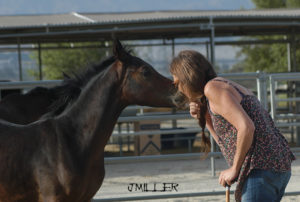
Jody Miller is a professional photographer specializing in Horse Photography, Equine Photography, and Equestrian photography. Her work can be viewed online here in her gallery section, and she is also featured at these Arizona Galleries: Arts Prescott Gallery, Sedona’s Village Gallery , Easy Street Galleria in Carefree and Dragonfly Arts in Cottonwood.
